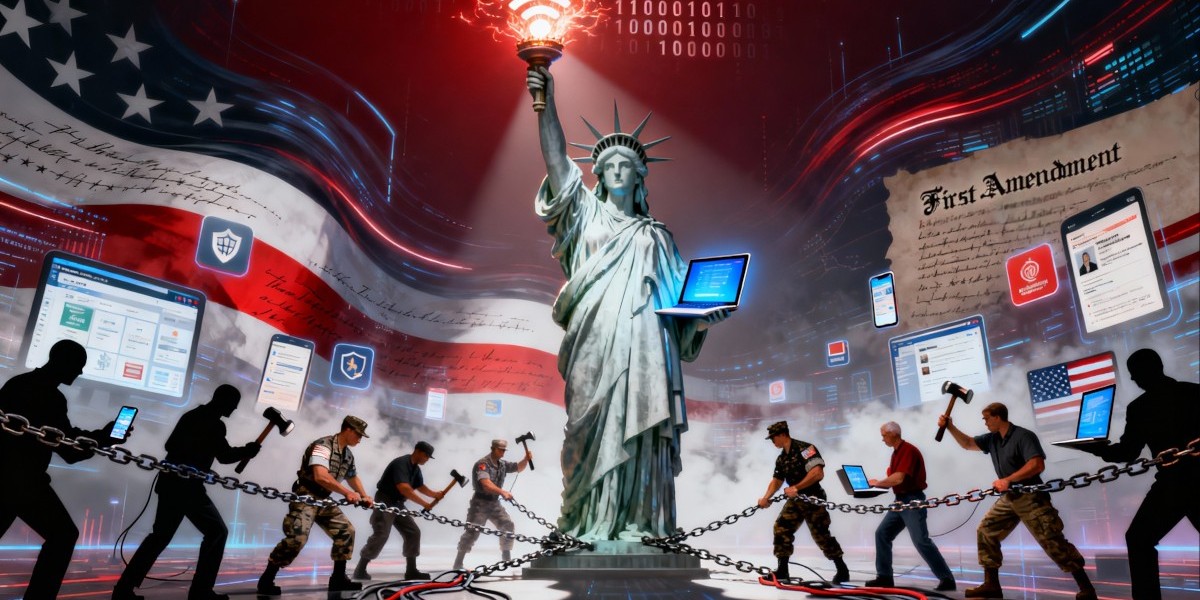The Internet Is Not Theirs to Control: A Patriot’s Call to Arms!
In today’s world, the internet is not some luxury toy for the elite or a frivolous pastime to be rationed by government overlords, unelected bureaucrats, or corporate gatekeepers. It is the lifeblood of modern existence—a necessity as critical as electricity or clean water. The notion that any government, agency, commission, or internet service provider (ISP) has the right to censor, restrict, or throttle access to the internet is an assault on the very freedoms that define our republic. The internet is no longer optional; it is the backbone of daily life, from securing employment to managing finances, accessing government services, and staying informed in a media landscape dominated by digital platforms. To allow any entity—public or private—to control, limit, or manipulate access to this vital resource is to undermine the principles of liberty enshrined in our Constitution. It’s time for freedom-loving Americans to rise up and demand an open, uncensored internet where digital freedom and privacy are non-negotiable.
The Internet: A Necessity, Not a Luxury
Gone are the days when the internet was a novelty, a clunky dial-up connection reserved for tech enthusiasts or the wealthy. Today, it is woven into the fabric of our lives. Want to apply for a job? Most employers won’t even glance at a paper resume—job applications are online, from corporate giants to local small businesses. Need to communicate with your employer? Email, instant messaging, and virtual meetings are the norm, not the exception. Managing finances? Good luck balancing your checkbook or paying bills without online banking, which 78% of Americans now use regularly, according to a 2023 Pew Research Center study. Even government services—Social Security, disability benefits, tax filings—are increasingly digitized, with agencies like the Social Security Administration requiring online accounts for basic interactions.
For businesses, the internet is the great equalizer. A small startup in rural America can compete with global corporations through e-commerce, social media, and digital marketing. Without unfettered access to the internet, these businesses are crippled, unable to reach customers, process transactions, or stay competitive. The U.S. Chamber of Commerce reported in 2024 that 84% of small businesses rely on online platforms for at least half their revenue. Denying or restricting internet access is akin to shutting off their oxygen supply.
And let’s not forget the role of the internet as the primary source of news and information. In 2025, over 70% of Americans get their news from online sources, whether through independent websites, social media, or digital news outlets, according to Statista. The days of flipping through a physical newspaper or tuning into the 6 o’clock broadcast are fading fast. The internet is where ideas are shared, debates are had, and truth is sought. To censor it is to choke the free flow of information, a cornerstone of any free society.
The Threat of Censorship: A Direct Attack on Liberty
Yet, despite its indispensability, the internet is under siege. Governments, agencies, and self-appointed arbiters of truth—often fueled by liberal elitism and a disdain for free thought—seek to control what we see, say, and share online. From shadowy commissions like the Federal Communications Commission (FCC) to Big Tech oligarchs colluding with leftist bureaucrats, the push to censor content, throttle access, or prioritize certain voices over others is a direct attack on the principles of free speech and individual liberty. These power-hungry entities act as if they own the internet, as if they have the divine right to decide what’s “acceptable” for you to read, watch, or post.
Internet service providers, too, have gotten in on the act, acting like feudal lords of the digital realm. ISPs are not the owners of the internet—they are common carriers, mere gateways that should deliver data without prejudice. Yet, some have the audacity to throttle speeds, block content, or prioritize paid traffic, creating a tiered internet where only the wealthy or well-connected get full access. This is not just unfair; it’s un-American. A few decades ago, denying someone telephone service or access to newspapers would have been unthinkable. Today, restricting internet access is no different—it’s a deliberate attempt to silence, marginalize, and control.
The left’s obsession with censorship is particularly galling. Under the guise of fighting “misinformation” or “harmful content,” liberal technocrats and their allies in government push for policies that stifle dissent and suppress truth. They claim it’s for our own good, as if we’re too stupid to think for ourselves. This paternalistic nonsense is a slap in the face to every American who values the First Amendment. The internet is the modern public square, and no one—especially not some woke bureaucrat or Silicon Valley socialist—gets to decide who speaks or what they say.
The Stakes: Digital Freedom Is Constitutional Freedom
Let’s be clear: the internet is not just a tool; it’s a fundamental extension of our constitutional rights. The First Amendment guarantees free speech, and the internet is the primary medium through which that speech is exercised today. The Fourth Amendment protects our privacy, yet government surveillance programs and ISP data harvesting threaten our digital security. The Fourteenth Amendment ensures equal protection under the law, but a censored or tiered internet creates a digital underclass, denied the same opportunities as those with unrestricted access.
Denying or limiting internet access is not just inconvenient—it’s a form of oppression. It’s the equivalent of barring someone from the public square, bugging their phone, or burning their newspaper. It’s a betrayal of the American promise of liberty and equality. And make no mistake: the push for internet control comes from those who hate the chaos of free thought. They fear a world where ideas—good, bad, or controversial—compete openly. They want a sanitized, controlled digital dystopia where only their approved narratives survive. This is not the America our founders envisioned, and it’s not the America we should tolerate.
The Path Forward: A Call to Action
Freedom-loving Americans must stand united against this assault on our digital liberty. We cannot allow governments, agencies, or corporations to gatekeep the internet. It’s time to demand legislation that enshrines net neutrality—not the warped, government-controlled version peddled by liberals, but true neutrality where ISPs deliver all content equally, without throttling or censorship. We must push for laws that protect digital privacy, banning invasive data collection and government overreach. And we must hold Big Tech accountable, breaking up monopolies that collude with leftist regimes to silence conservative voices.
Every patriot has a role to play. Write to your representatives. Demand they oppose any legislation that enables internet censorship or restricts access. Support organizations fighting for digital freedom, like the Electronic Frontier Foundation or conservative tech advocacy groups. Boycott ISPs that engage in anti-competitive practices or data harvesting. And most importantly, keep speaking out—online and offline. The internet is our megaphone, and we must use it to expose the enemies of freedom and rally others to the cause.
Questions to Ponder: Uncovering the Threat to Our Republic
To fully grasp the danger of internet censorship and restriction, ask yourself these questions:
How would your life be impacted if your internet access was suddenly limited or censored? Consider your job, finances, access to news, or ability to communicate. What would it mean to lose that freedom?
Who benefits when the government or corporations control what you see online? Are these entities acting in your interest, or are they consolidating power for themselves?
Why do you think some politicians and tech giants are so eager to label certain content as “misinformation”? What happens when they get to define truth for everyone?
How does a tiered internet—where access depends on wealth or connections—affect equality and opportunity in America? Does this align with the principles of our Constitution?
What parallels can you draw between historical attempts to control information (e.g., book burnings, state-run media) and modern internet censorship? Are we heading down a similar path?
Reflect on these questions. Discuss them with your friends, family, and neighbors. The answers will reveal the insidious threat internet control poses to our republic and our culture. They’ll show you why this fight matters—not just for today, but for the future of our nation.
Conclusion: Defend the Digital Frontier
The internet is not a privilege to be doled out by power-hungry elites; it is a right, as fundamental to modern life as the freedoms enshrined in our Constitution. It is the engine of opportunity, the conduit of truth, and the battleground where ideas must remain free. To allow governments, agencies, or corporations to censor, restrict, or manipulate access is to surrender our liberty to the very forces that despise our values. We cannot let the left’s woke authoritarianism or corporate greed turn the internet into a walled garden where only their voices thrive.
This is a call to arms for every patriot who cherishes freedom. Stand up, speak out, and fight for an open internet. Demand accountability from those who seek to control it. Our republic’s survival depends on it. If we lose the digital frontier, we lose the soul of America. Let’s not let that happen on our watch.












